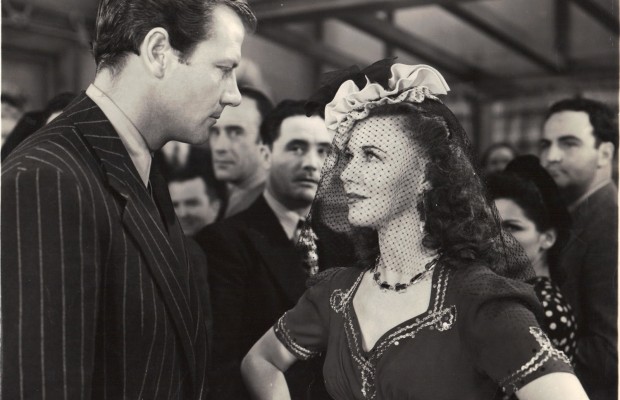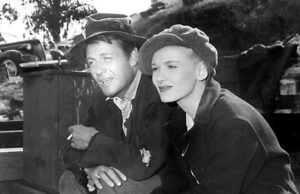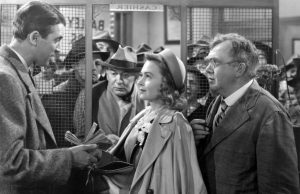Primrose Path (1940)

Toronto Film Society presented Primrose Path (1940) on Monday, January 9, 1978 in a double bill with The Man Who Came To Dinner as part of the Season 30 Monday Evening Film Buff Series, Programme 5.
Production Company: RKO. Producer, Director: Gregory La Cava. Screenplay: Allan Scott, Gregory La Cava. Based on: the play by Robert L. Buckner, Walter Hart and the novel “February Hill” by Victoria Lincoln. Assistant Director: Edward Killy. Special Effects: Vernon L. Walker. Photography: Joseph H. August. Editor: William Hamilton.
Cast: Ginger Rogers (Ellie May Adams), Joel McCrea (Ed Wallace), Marjorie Rambeau (Mamie Adams), Henry Travers (Gramp), Miles Mander (Homer), Queenie Vassar (Grandma), Joan Carroll (Honeybell), Vivienne Osborne (Thelma), Carmen Morales (Carmelita).
As balancing acts go, Primrose Path probably succeeds better than most at being faintly ribald, seamy-sided comedy which yet cautiously avoids giving more than a minimum of offense to the film industry’s intra-and-extra-curricular censors. Much of its naughtiness is written between the lines, this accounting for some of the blank spaces in the comedy. A few of the uglier splotches of character are hastily whitewashed at the end, this accounting for some of the curious inconsistencies of its people. Within these obvious, understandable, censor-imposed limitations, it yet trips its way blithely, briskly, humorously and cannily. And still our admiration for it is as a demonstration of dramatic footwork rather than as drama itself. It is skillful, clever and unreal.
And in pronouncing that judgement, we are aware of being brought into immediate conflict with a body of opinion which will stoutly insist that realism is the very goddess Gregory La Cava’s new film serves. Under that factworship they would automatically file any comedy-drama centered about so morally unorthodox a breed as the Adamses of Primrose Hill. Grannie was on the retired list of that oldest profession; Mother Mamie had followed in her well-worn footsteps; Father Homer, who once had been a college man, was up in Greek philosophy and still better versed in gin; Sister Honeybell, aged 9, was Granny in miniature (“Don’t swat your mother, boys” was her favorite recitation); and among them was Ellie May who fell in love with the young man who ran the hamburger stand.
Realism can go just so far. It can produce a few Home, Sweet Home vignettes as shocking as they are amusing. It can catch the sound of human conversation travelling the sub-strata waves that naturally would emanate from a sardine-fleet port on the Pacific Coast. It can catch the rose-on-an-ash-heap sweetness of a young girl’s first love, and the bitterness of her despair when her lover tosses her contemptuously back upon the heap; and it can dignify the family bonds that exist even among the Adamses of Primrose Hill. But realism cannot escape altogether the censors, or the box-office rule that comedies (beyond all others) must end happily, or the screen’s own limited appetite for reality. Mr. La Cava has had to make too many concessions to unreality, and some of them have turned his study of the home life of a shanty girl into a frequently incredible, though artful, Ginger Rogers-Joel McCrea romantic comedy.
The performance is generally good, and, if it errs, it is on the side of over-broadening roles that were broad to begin with. Miss Rogers is variably effective and never less convincing than as the tomboy broken to harness by Mr. McCrea’s first kiss. Much better are Queenie Vassar’s rouged, bewigged, thoroughly evil old Grannie; Miles Mander’s gin-soaked Homer; Marjorie Rambeau’s flouncing, good-natured, sentimental Mamie Adams and little Joan Carroll’s amazingly precocious Honeybell, who obviously was going to be a chippie off the old block. Any resemblance, by the way, between this Primrose Path and that staged on Broadway last season is purely coincidental. Mr. La Cava and Allan Scott have rolled their own version.
The New York Times by Frank S. Nugent, March 23, 1940
Notes compiled by Barry Chapman












Leave a Reply